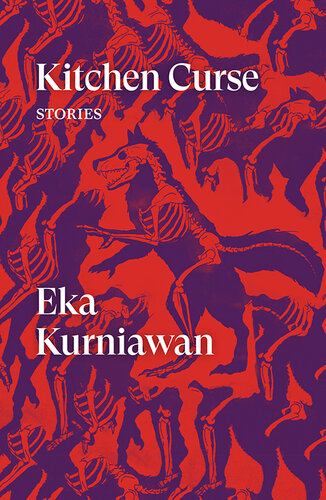
Kitchen Curse
Stories
کتاب های مرتبط
- اطلاعات
- نقد و بررسی
- دیدگاه کاربران
نقد و بررسی

August 1, 2019
Little fables of degradation from one of Indonesia's most famous authors. Kurniawan earned international acclaim for his epic exploration of his country's history and folklore, Beauty Is a Wound (2015). This was the author's first work to be published in English, and translations of his novels that have appeared since then have been increasingly disappointing. The short fictions collected in this volume continue that unfortunate trend. Kurniawan has never been afraid to shy away from the grotesque and the squalid, but, with stories like "Graffiti in the Toilet" and "Don't Piss Here," he seems to be daring readers to look away. More importantly, these very brief tales seem to be gross for the sake of being gross. The violence and filth and sexual transgression in Beauty Is a Wound served a larger purpose in depicting a country with a complicated, troubled past and contemporary political and economic challenges. To the extent that there is a hint of substantive content, it's difficult to discern how much of it will be of interest only to an Indonesian audience. For example, the story "Rotten Stench" describes--in one seven-page sentence--a massacre in the fictional city of Halimunda that echoes a similar atrocity that occurred 18 years earlier. It's sickening, certainly, and the structural choice Kurniawan makes propels us forward even when we might want to stop, and one might make the argument that the author's decision to provide almost no context for these scenes of chickens picking at the genitals of corpses (the word "genitals" appears a lot in these stories) and "flesh and blood that had congealed into porridge" suggests a certain nauseating universality, but...how many readers will understand the barely enumerated distinctions between these two massacres, and how many need a graphic lesson in why mass murder is, generally speaking, bad? Crude and pointless--unless crudity is the point.
COPYRIGHT(2019) Kirkus Reviews, ALL RIGHTS RESERVED.

October 1, 2019
Kurniawan, the first Man Booker International Prize-nominated Indonesian writer (he was long-listed in 2016 for Man Tiger), here makes his collection-in-English debut, with the majority of the 16 stories translated by Tucker, his PEN/Heim Translation Fund-awarded Beauty Is a Wound translator; three of the 16 stories are anglophoned by Tiffany Tsao, Maggie Tiojakin, and Benedict Anderson. The strongest story here is the last one, the titular "Kitchen Curse," a darkly hysterical cautionary tale about an abused wife who goes "to the city archive hoping to find some new recipe ideas" (italics in original) and instead discovers an inspiring record of culinary mass murder by "everyday spices." Other successes include "Don't Piss Here!" featuring a frustrated shop owner who discovers sexual satisfaction after waiting overnight to catch the miscreant who urinates regularly on her parking lot wall; "Caronang," about a bi-pedal doglike creature stolen from its natural habitat who wreaks havoc on his kidnapper's family; and "The Otter Amulet," in which the reunion in adulthood between a bullied boy and his designated protector has disturbing results. Sex, violence, and betrayal loom large throughout, as in Kurniawan's award-winning previous novels; his shorter attempts, however, prove uneven at best, too often feeling abrupt and unfinished. VERDICT Despite possible disappointment, Kurniawan groupies won't be deterred; for newbies, go to the novels for greater fictional satisfaction.--Terry Hong, Smithsonian BookDragon, Washington, DC
Copyright 2019 Library Journal, LLC Used with permission.

Starred review from December 16, 2019
Kurniawan’s deadpan, incisive collection (after the novel Beauty Is a Wound) pares out the gruesome consequences of acting on misconceptions. In “Making an Elephant Happy,” childhood innocence becomes deadly, while in “Peter Pan,” a revolutionary rejects his privilege to become a martyr. “Caronang” offers a new twist on the timeless tale of man’s misguided impulse to tame a wild beast—in this case, a canine creature with opposable thumbs that is native to Indonesia, stands bolt upright, and is cute as a “living doll” until it learns to shoot a gun. Each sardonic entry is made more alluring by the reliance on a mythic plot device—an amulet made of otter, a stone with a narrative point of view. The accumulation of bathroom scrawls in “Graffiti in the Toilet,” each more blindly ecstatic than the last, encapsulates Kurniawan’s interest in how the human drive to make one’s mark often paves over good intentions. Erupting with awareness and dark wit, this work puts Kurniawan in league with Hassan Blasim, Witold Gombrowicz, and Daniil Kharms.

























دیدگاه کاربران